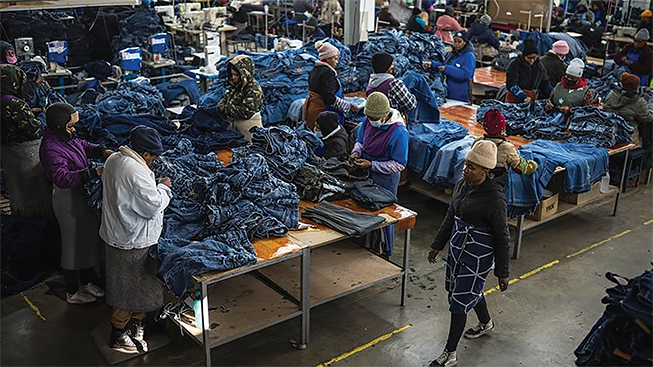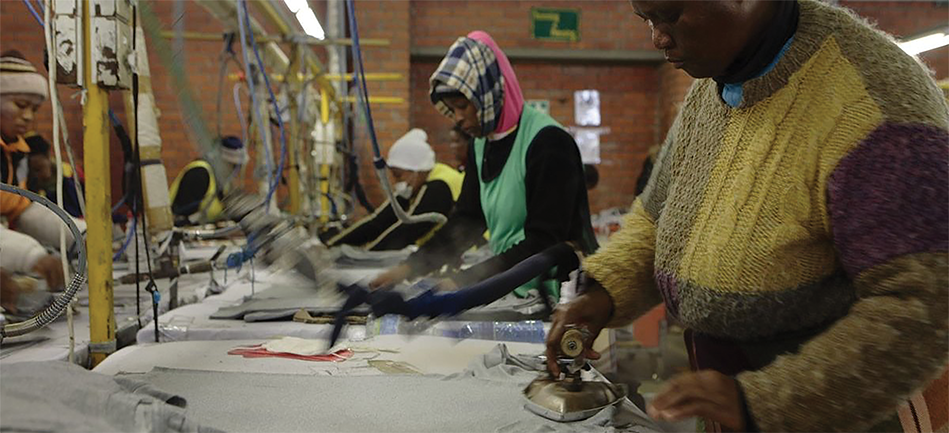WOES: A total of 7 000 affected in the kingdom’s textile industry – unable to pay rent, they have returned to their villages, while others have taken the dangerous route to cross the border to join illegal mining syndicates in South Africa…
By Pavan Kulkarni
US President Donald Trump has wrecked the livelihoods of thousands of women working in Lesotho’s textile sector by spooking the small land-locked southern African kingdom with 50% tariffs – the highest imposed on any nation – before dropping it to 15% after the 90-day pause.

Unable to pay rent for their rooms in the cities, thousands have returned to their villages, whose subsistence farming-based rural economy cannot sustain their families, said Solong Senohe, the general secretary of the United Textile Employees (UNITE).
Desperate, many have taken the dangerous road across the border to labour for the illegal mining enterprises in South Africa, risking violence at the hands of criminal gangs as well as the police. Their children are out of school because they were unable to pay the fees.
The new reduced tariff rate of 15% he announced last week, cannot easily reverse the damage he had already done by casting the shadow of a 50% tariff on one of the world’s poorest countries.
The uncertainty over the future of the country’s clothes industry prompted Lesotho to declare a national “state of disaster” last month, in order to speed up job-creation.
With little industrial diversification and an unemployment rate of 25%, the largest private sector employer in Lesotho – dubbed the Denim capital of Africa – is the textile industry. About 75% of its production is exported to the US, to customers like Wrangler, Levi’s, etc. The development of this industry was fuelled by the African Growth and Opportunity Act (AGOA), legislated by the US in 2000 to provide tariff-free access to goods manufactured using cheap African labour for its domestic market. This act, which was repeatedly renewed, was set to expire in September.
Lesotho’s trade minister, Mokhethi Shelile, was in the process of negotiating the renewal when, on April 2, Trump announced a 50% tariff on this country, which, according to him, “nobody has ever heard of”. Shocked, Shelile thought, “No, this cannot be real,” she told AP. “What did we do to deserve this?”
Before the tariffs took effect, Trump announced a 90-day pause on April 9, which was later extended. Finally, on August 7, the new rate – 15% for Lesotho – went into effect.” But the mere threat of 50% had already delivered such a blow to the economy that “to claw back … to where we were before … is going to take time,” maintains the trade minister.
Orders dried up for the 11 large employers – Precious Garments, Tzicc Clothing Manufacturers, Maseru-E Textiles, etc – that manufacture for popular US brands, including GAP, Reebok, Calvin Klein Jeanswear, Walmart, etc.
They employ about 12 000 mainly women workers – over a third of the 35 000 labouring in Lesotho’s textile industry. After rushing to deliver the existing orders before the tariffs took effect, they started laying off workers from late May onwards, said Senohe.
“The temporary workers on contract were fired. Those with permanent employment were sent on an unpaid leave for three months till September,” the UNITE leader told Peoples Dispatch. By then, employers hoped, clarity on tariffs would allow them to gauge the future of their US market and accordingly decide how many workers to retain.
He estimates that about 7 000 workers – over half of the 12 000 manufacturing for the US market – have thus been left without pay. Unable to pay rent without wages, most of them have returned to their villages.
With no livelihood opportunities back home, some crossed the border to South Africa without documentation, while others exhausted their little savings and sold their belongings to survive.
Even if orders resume under the new reduced tariffs and workers are called back to factories in September, “who will pay all the money they already lost? If they start earning wages from October, it is only next year that they can pay the school fees. So their children have lost an academic year,” added Senohe. Further, it is unlikely that all the roughly 7 000 workers’ jobs will be restored. The 15% tariff that went into effect on August 7 is not only a massive increase over the previous 0%, but also higher than the 10% Trump has imposed on Kenya and eSwatini.
The competition for the US market between the three countries – with each trying to outbid the other with cheaper labour – has more or less equalised wages and production costs, Senohe explained. However, the 10% tariff imposed on Kenya and Swaziland is 2/3rd of the 15% on Lesotho.
This difference, he fears, might prove large enough for many companies to cut costs by shuttering factories in Lesotho and moving their production to competing countries with lower tariffs.
It is in the face of such adversity that the union will now negotiate with employers to salvage jobs and wages in this industry, so central to Lesotho’s economy that the mass lay-offs of its workers have also squeezed the livelihoods of taxi drivers, street vendors, etc.
Textile workers are a large bulk of their customers, Senohe added. As they left towns and cities in thousands, unable to pay rent, rooms lying vacant near the factories have become a problem serious enough for the trade minister to reassure, “We’re talking to people in real estate”, among others affected. – People’s Despatch, additional reporting by Weekly SA Mirror





























